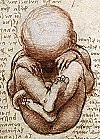중년
Middle age| 시리즈의 일부(on) |
| 인간성장 발전. |
|---|
 |
| 스테이지들 |
| 생물학적 이정표 |
| 발달과 심리 |
중년은 유년기와 노년기의 중간에 해당하는 나이 범위입니다.[1]정확한 범위는 의학적 논쟁의 대상이지만, 이 용어는 일반적으로 약 40-45세에서 65세까지의 연령 범위를 나타내는데 사용됩니다.[2][3][4]이 삶의 단계는 나이가 들면서 개인들의 점진적인 신체적, 인지적 그리고 사회적인 쇠퇴로 특징지어집니다.
성인 중기
이 기간은 일반적으로 "중년"이라고 불리며, 성별에 따라서도 약 40세 이상에서 약 60세 이상의 나이로 정의될 수 있습니다.[2][3][5][6][7][8]젊은 성인과 이 단계 사이에는 많은 변화가 일어날 수 있습니다.[9][10][11][12][13][14][15] 메리엄-웹스터와 옥스포드 영어 사전의 정의와 같은 일부 정의는 45세 정도에 나중에 시작합니다.어떤 것들은 50세까지 늦게 시작합니다.중년에 대한 정확한 정의가 무엇인지에 대해서는 보편적인 공감대가 형성되어 있지 않지만, 출산력의 급격한 저하의 시작, 머리카락의 잿빛, 기회의 감소 등이 통상적인 특징입니다.미국 심리학회는 "중도 성인"을 35세 또는 36세에 시작하는 것으로 정의하고, 많은 범위는 60세 또는 65세까지 끝나지 않습니다.[16]팔레스타인 여성을 대상으로 한 한 연구는 중년을 40세 전후부터 시작하는 것으로 간주합니다.[17]현대의 사회 과학자들은 일반적으로 중년기가 35세나 40세쯤에 시작해서 55세나 60세쯤에 끝나며, 또한 '문화적 그리고 사회적 인구학적' 요소들에 의존한다는 것에 동의합니다.[18]
중년 혹은 중년의 사람들은 계속해서 관계를 발전시키고 관계의 변화에 적응합니다.그러한 변화는 자라거나 성장한 아이들과 나이가 든 부모들 사이의 성숙한 관계에서 매우 분명하게 드러납니다.지역 사회 참여는 지속적인 경력 [19]개발과 마찬가지로 성인기의 이 단계에서 상당히 전형적입니다.
물리적 특성
중년의 성인들은 눈에 보이는 노화 징후를 보이기 시작할 수도 있습니다.이 과정은 골다공증을 가진 여성들에게 더 빨리 진행될 수 있습니다.신경계에 변화가 생길 수도 있습니다.복잡한 작업을 수행할 수 있는 기능은 그대로 유지됩니다.51세를 전후한 세월 동안 여성들은 자연분만을 끝내는 갱년기를 경험합니다.[20]갱년기는 많은 부작용을 가질 수 있습니다.피부에 변화가 생길 수 있고, 유산소 성능의 감소, 최대 심박수의 감소, 그리고 백발과 탈모를 포함한 다른 변화들이 있을 수 있습니다.중년 성인의 감각 민감도가 가장 낮은 것으로 나타났습니다.[21]이러한 측정값은 일반적인 것이며 사람들은 다른 속도와 시간으로 변화를 나타낼 수 있습니다.[22]
주로 심장병, 암, 고혈압, 당뇨병과 같은 건강 문제로 인해 사망률이 증가하기 시작할 수 있습니다.[19]그럼에도 불구하고, 선진국의 대부분의 중년들은 노년까지 살기를 기대할 수 있습니다.
35세 전후부터 임신한 여성은 선진 모성 연령으로 간주되며, 출산력의 현저한 저하가 나타나기 시작하며, 보통 50세 전후의 폐경기로 끝납니다.[23]갱년기의 정상 범위는 45에서 55입니다.[24]
인식의
에릭슨은 이 성인기를 에릭슨의 심리사회적 발달의 8단계 중 일곱 번째 단계인 생성성 대 정체로 말합니다.중년의 성인이나 중년의 사람들은 인지능력의 감소를 보상하기 위해 삶의 경험과 전략이 개발되기 때문에 보통 눈에 띄지 않는 인지능력 상실을 경험할 수 있습니다.[25]
이 단계에서 어른들은 종종 자신보다 오래 지속될 수 있는 것들을 가지려고 노력합니다.중장년층이 미래 세대에 대해 갖는 관심과 헌신인 생성성은 이 단계에서 발전의 큰 부분을 차지합니다.[26]
사회적, 성격적 특성
어떤 사람들은 결혼 만족도가 그대로 남아 있지만, 다른 가족 관계는 더 어려워질 수 있습니다.진로 만족은 내적 만족과 만족감에 더 중점을 두고, 야망과 발전에 대한 열망에 덜 중점을 둡니다.[19]그래도 경력 변경은 자주 일어납니다.중년기나 중년기는 사람들이 자신의 삶을 재고하고 자신의 성취를 평가함으로써 자신의 삶을 재조명하는 시기가 될 수 있습니다.도덕성이 변화하고 더 의식적이 될 수도 있습니다.[27]이러한 삶의 발달 단계에 있는 사람들이 소위 중년의 위기를 겪는다는 인식은 상당 부분 잘못된 것입니다.[28]성격적 특성은 이 기간 내내 안정적으로 유지되며,[1] 성인기 중반의 관계는 안정적인 관계로 계속 발전할 수 있습니다.[19]
참고 항목
참고문헌
- ^ a b "APA PsycNet". psycnet.apa.org. Archived from the original on 2020-01-02. Retrieved 2016-09-25.
- ^ a b "Middle Age: definition of middle age in Oxford dictionary (American English) (US)". Oxforddictionaries.com. Archived from the original on October 14, 2014. Retrieved 2016-06-15.
- ^ a b "Definition of MIDDLE AGE". www.merriam-webster.com. Archived from the original on 2016-10-27. Retrieved 2022-10-04.
- ^ "The Language Of Ageism: Understanding How We Talk About Older People". Dictionary.com. 2021-05-19. Retrieved 2023-07-13.
When is middle age? We define middle age as "the period of human life between youth and old age, sometimes considered as the years between 45 and 65 or thereabout."Given the different views on when old age begins, it shouldn't surprise you to learn that the exact range of middle age is not set in stone either. In general, our age range of "45 to 65" is around the age range generally used to say when middle age supposedly occurs. Polling shows that people may think middle age begins later or earlier depending on who you ask.
- ^ 미들 에이지 2017-07-12 웨이백 머신에서 보관.CollinsDictionary.com .콜린스 영어 사전 – Complete & Unabridged 11판2012년 12월 05일 회수.
- ^ Erikson, Erik H.; Erikson, Joan M. (1997). The Life Cycle Completed (extended ed.). New York: W. W. Norton & Company (published 1998). ISBN 978-0-393-34743-2.
- ^ "APA Dictionary of Psychology". dictionary.apa.org. Archived from the original on 2018-04-27. Retrieved 2022-10-04.
- ^ "middle age psychology Britannica". www.britannica.com. Archived from the original on 2022-10-04. Retrieved 2022-10-04.
- ^ Gordon-Salant, Sandra; Frisina, Robert D.; Fay, Richard R.; Popper, Arthur (3 May 2010). The Aging Auditory System. Springer Science & Business Media. ISBN 9781441909947. Archived from the original on 19 March 2023. Retrieved 1 November 2020 – via Google Books.
- ^ "Middle%20age Search Online Etymology Dictionary". Archived from the original on 2022-10-19. Retrieved 2022-10-23.
- ^ "Chambers – Search Chambers". Archived from the original on 2022-10-19. Retrieved 2022-10-23.
- ^ "The American Heritage Dictionary entry: Middle%20age". Archived from the original on 2022-10-19. Retrieved 2022-10-23.
- ^ Infurna, F. J.; Gerstorf, D.; Lachman, M. E. (2020). "Midlife in the 2020s: Opportunities and Challenges". The American Psychologist. 75 (4): 470–485. doi:10.1037/amp0000591. PMC 7347230. PMID 32378943.
- ^ Lachman, M. E. (2015). "Mind the Gap in the Middle: A Call to Study Midlife". Research in Human Development. 12 (3–4): 327–334. doi:10.1080/15427609.2015.1068048. PMC 4734389. PMID 26848288.
- ^ Zare, N.; Sharif, F.; Dehesh, T.; Moradi, F. (2015). "General Health in the Elderly and Younger Adults of Rural areas in Fars Province, Iran". International Journal of Community Based Nursing and Midwifery. 3 (1): 60–66. PMC 4280558. PMID 25553335.
- ^ "APA Dictionary of Psychology". Archived from the original on 2022-08-18. Retrieved 2022-10-04.
- ^ Hammoudeh, Doaa; Coast, Ernestina; Giacaman, Rita; Lewis, David; Rabaia, Yoke; Leone, Tiziana (February 2018). "Age of despair or age of hope? Elderly Palestinian women's perspectives on health in midlife". The Lancet. 391: S9. doi:10.1016/S0140-6736(18)30334-9. S2CID 54286370.
- ^ Hedgeman, Elizabeth; Hasson, Rebecca E.; Karvonen-Gutierrez, Carrie A.; Herman, William H.; Harlow, Siobán D. (2018). "Perceived stress across the midlife: Longitudinal changes among a diverse sample of women, the Study of Women's health Across the Nation (SWAN)". Women's Midlife Health. 4. doi:10.1186/s40695-018-0032-3. PMC 6027744. PMID 29973982.
- ^ a b c d Stern, Theodore (2016). Massachusetts General Hospital comprehensive clinical psychiatry. London: Elsevier. ISBN 978-0-323-29507-9.
- ^ Bourgeois, F. John; Gehrig, Paola A.; Veljovich, Daniel S. (1 January 2005). Obstetrics and Gynecology Recall. Lippincott Williams & Wilkins. ISBN 9780781748797. Archived from the original on 10 January 2023. Retrieved 1 November 2020 – via Google Books.
- ^ Harkins, S. W.; Price, D. D.; Martelli, M. (1986-01-01). "Effects of Age on Pain Perception: Thermonociception". Journal of Gerontology. 41 (1): 58–63. doi:10.1093/geronj/41.1.58. ISSN 0022-1422. PMID 3941257.
- ^ Leyk, Dieter; Rüther, Thomas; Wunderlich, Max; et al. (2010-11-19). "Physical Performance in Middle Age and Old Age". Deutsches Ärzteblatt Online. 107 (46): 809–816. doi:10.3238/arztebl.2010.0809. ISSN 1866-0452. PMC 2999945. PMID 21151416.
- ^ staff, familydoctor org editorial; Rice, Alex; Rice, Alex (September 7, 2017). "Pregnancy After 35: Advanced Maternal Age". familydoctor.org. Archived from the original on October 4, 2022. Retrieved October 4, 2022.
- ^ "What is Menopause?".
- ^ Gordon-Salant, Sandra; Frisina, Robert D.; Fay, Richard R.; Popper, Arthur (3 May 2010). The Aging Auditory System. Springer Science & Business Media. ISBN 9781441909947 – via Google Books.
- ^ "APA PsycNet". psycnet.apa.org. Archived from the original on 2021-05-26. Retrieved 2021-05-26.
- ^ Kellner, Douglas; Habermas, Jurgen (March 1992). "Moral Consciousness and Communicative Action". Contemporary Sociology. 21 (2): 278. doi:10.2307/2075511. ISSN 0094-3061. JSTOR 2075511.
- ^ Levenson, Michael R.; Aldwin, Corolyn M. (2014), "Change in Personality Processes and Health Outcomes", Handbook of Personality Development, Routledge, doi:10.4324/9781315805610.ch21, ISBN 978-1-315-80561-0
외부 링크
추가열람
- Barbara Bradley Haggerty (2016). Life Reimagined: The Science, Art, and Opportunity of Midlife. Riverhead Books. ISBN 978-1594631702.
- 래크먼, M.E. (에드.)(2001).중년 발달 안내서.뉴욕: 존 와일리.
- Lachman, Margie E.; Teshale, Salom; Agrigoroaei, Stefan (2015). "Midlife as a pivotal period in the life course". International Journal of Behavioral Development. 39 (1): 20–31. doi:10.1177/0165025414533223. PMC 4286887. PMID 25580043.


